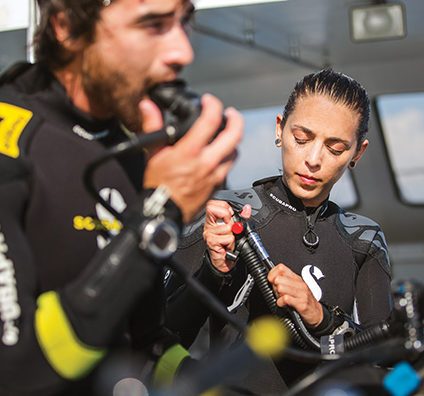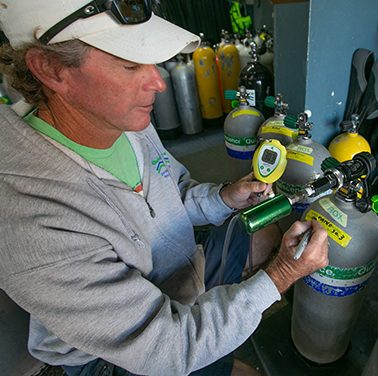INFECTION
CONTROL

INFECTION CONTROL SHOULD BE A PRIORITY at any dive business, especially those that rent out equipment. Regulators, masks, snorkels, and BCD oral inflators go into divers’ mouths, and wetsuits, booties, and other miscellaneous pieces of equipment contact their bodies. While some may think that rinsing these with water is sufficient, it would be better to ensure that they are cleaned thoroughly to prevent the transmission of disease between divers. Here are some recommendations for improving infection control in your dive business.
ASSESS YOUR INFECTION
CONTROL PROCEDURES
It’s important to disinfect dive gear, especially gear that contacts the eyes, nose, or mouth. While rinsing your equipment in fresh water is important to remove any salt after a day of diving, this is insufficient to kill potentially pathogenic microorganisms that may be present.
Take some time to find out what cleaning products are available near you, then do some research to find out which ones are OK to use on scuba equipment. Not all cleaning, sanitizing, or disinfecting products are made equally; some differences include price, active ingredient, and whether the product is ready to use or should be diluted first. Additionally, many products require that items dry completely after being disinfected — an important step in the process. If you are in a particularly hot or humid area, this may require you to make some changes, such as increasing ventilation in your rental equipment room.
It is important to ensure that your infection control procedures will reliably remove any contamination from the equipment you are using or renting, so reading and following the directions for the product you have chosen are necessary to get the advertised benefits. This includes following directions for dilution, contact time, rinsing, and drying. Once equipment is clean, it is important that it is not made dirty again. Along the same vein, any clean areas should not be contaminated with dirty equipment. For example, if you elect to rinse equipment in a communal freshwater rinse tank before disinfecting, make sure that clean equipment does not enter this dirty water.
Divers who bring personal items should not be allowed to rinse their equipment unsupervised as they may upset your infection control system. Advise them of your disinfection policy — if they decline to have their equipment disinfected, encourage them to take their equipment and rinse it at home or in their hotel room. You may also consider providing individual rinse tanks or spraying their equipment with a hose to remove any salt or other matter.
ASSESS YOUR VENTILATION
AND TEMPERATURE
In hot and humid areas, mold and other microorganisms can grow more readily on surfaces, especially on items that do not have the chance to dry completely. This can include masks, snorkels, and the mouthpiece and interior surfaces of scuba regulators. If equipment is being stored and not used frequently, it is even more important to ensure that it dries to prevent the growth of mold. Be sure that equipment is stored in well-ventilated areas and away from other wet equipment.
REVIEW YOUR STANDARD
OPERATING PROCEDURE
Your standard operating procedures (SOPs) should include a section on disinfectant use, disposal, and storage. It is important to do a walk-through of your rental equipment area, rinsing area, or wherever you perform disinfection to be sure the layout is convenient and conducive to disinfecting gear quickly and easily.
SOPs are important when using a product that has directions that must be followed, such as dilution and personal protective equipment (PPE) for cleaning products. These procedures allow your staff to find instructions easily and help them to know exactly what is expected in terms of procedures to be performed. Additionally, this helps you ensure that instructions are being followed by staff and can help you evaluate whether everything is being done correctly. If you do not have a set of SOPs already, take some time to write down directions and steps for how most tasks in your business should be performed. SOPs are different from emergency action plans (EAPs) and typically do not include emergency information. After doing this, make your staff aware of the new document and conduct a training session or high-level review to familiarize staff with
your expectations.
Most importantly, monitor your staff’s performance for effectiveness and compliance, and be sure to make staff aware whenever a policy or procedure is updated. This is important not only for infection control procedures but also for all SOPs in your business.
While preventative actions such as disinfection may not always seem like pressing concerns, it is important to do whatever you can to prevent the spread of diseases and infections, especially since this can be accomplished relatively easily.

DAN Customer Service
Mon–Fri, 8:30 a.m. – 5 p.m. ET
+1 (919) 684-2948
+1 (800) 446-2671
Fax: +1 (919) 490-6630
24/7 Emergency Hotline
In event of a dive accident or injury, call local EMS first, then call DAN.
24/7 Emergency Hotline:
+1 (919) 684-9111
(Collect calls accepted)
DAN must arrange transportation for covered emergency medical evacuation fees to be paid.
Medical Information Line
Get answers to your nonemergency health and diving questions.
Mon–Fri, 8:30 a.m. – 5 p.m. ET
+1 (919) 684-2948, Option 4
Online: Ask A Medic
(Allow 24-48 hours for a response.)
